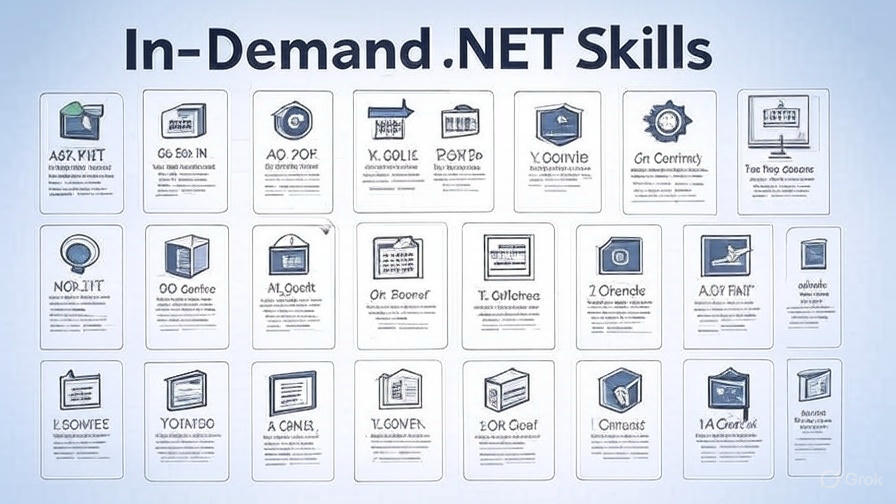In-Demand .NET Skills That Get You Hired
In today’s competitive job market, mastering in-demand .NET skills can significantly boost your career prospects. Whether you’re a seasoned developer or just starting, understanding what employers are looking for is crucial. This article will guide you through the essential .NET skills that can make you stand out and land your dream job. If you’re considering an online .NET course or aiming for a .NET Core certification, you’re on the right path.
Why .NET Skills Are in High Demand
The .NET framework has been a cornerstone of enterprise-level applications for years. Its robustness, scalability, and versatility make it a favorite among developers and employers alike. Here are some reasons why .NET skills are highly sought after:
Versatility and Flexibility
.NET is not just limited to Windows applications. With the advent of .NET Core, developers can now build cross-platform applications that run on Windows, Linux, and macOS. This versatility makes .NET a valuable skill set for any developer.
Strong Community Support
The .NET community is vast and active. This means ample resources, forums, and third-party libraries are available to help developers solve problems and innovate. Being part of such a supportive community can accelerate your learning and problem-solving capabilities.
Enterprise-Level Applications
Many large enterprises rely on .NET for their critical applications. This creates a steady demand for skilled .NET developers who can maintain and upgrade these systems. Mastering .NET can open doors to lucrative job opportunities in top-tier companies.
Essential .NET Skills to Master
To become a sought-after .NET developer, you need to master a variety of skills. Here are some of the most in-demand .NET skills that can get you hired:
Proficiency in C#
C# is the primary programming language used in the .NET framework. It is essential to have a strong grasp of C# to develop efficient and scalable applications. Key areas to focus on include:
- Syntax and Structure: Understanding the basic syntax and structure of C# is fundamental.
- Object-Oriented Programming: Mastering OOP concepts like inheritance, polymorphism, encapsulation, and abstraction.
- Asynchronous Programming: Learning how to write asynchronous code using async and await keywords.
ASP.NET Core
ASP.NET Core is a modern, high-performance, open-source framework for building web applications. It is a critical skill for any .NET developer aiming to work on web development projects. Key areas to focus on include:
- MVC Architecture: Understanding the Model-View-Controller architecture and how to implement it in ASP.NET Core.
- RESTful APIs: Learning how to build and consume RESTful APIs.
- Middleware: Understanding how to use middleware to handle requests and responses.
Entity Framework Core
Entity Framework Core (EF Core) is an Object-Relational Mapping (ORM) framework that allows developers to work with databases using .NET objects. It is a crucial skill for data-driven applications. Key areas to focus on include:
- Database First Approach: Learning how to create a model from an existing database.
- Code First Approach: Understanding how to create a database from your model.
- LINQ: Mastering Language Integrated Query (LINQ) to query databases efficiently.
Blazor
Blazor is a new web framework that allows developers to build interactive web UIs using C# instead of JavaScript. It is gaining popularity and becoming an essential skill for .NET developers. Key areas to focus on include:
- Blazor Server: Understanding how to build server-side Blazor applications.
- Blazor WebAssembly: Learning how to build client-side Blazor applications that run directly in the browser.
- Component-Based Architecture: Mastering the component-based architecture of Blazor.
Cloud Integration
With the shift towards cloud computing, integrating .NET applications with cloud services is becoming increasingly important. Key areas to focus on include:
- Azure Services: Learning how to deploy and manage .NET applications on Microsoft Azure.
- AWS and Google Cloud: Understanding how to integrate .NET applications with other cloud providers like AWS and Google Cloud.
- Serverless Computing: Mastering serverless computing using Azure Functions or AWS Lambda.
Soft Skills for .NET Developers
While technical skills are crucial, soft skills can set you apart from other candidates. Here are some essential soft skills for .NET developers:
Problem-Solving
The ability to solve complex problems efficiently is a valuable skill. Employers look for developers who can think critically and come up with innovative solutions.
Communication
Effective communication is key to collaborating with team members, stakeholders, and clients. Being able to articulate your ideas clearly and listen actively can make you a valuable team member.
Adaptability
The tech industry is constantly evolving. Being adaptable and open to learning new technologies and methodologies can make you a more attractive candidate to employers.
Building a Strong Portfolio
Having a strong portfolio can significantly enhance your job prospects. Here are some tips for building an impressive .NET portfolio:
Personal Projects
Working on personal projects can demonstrate your passion and commitment to .NET development. It also provides an opportunity to showcase your skills and creativity.
Open Source Contributions
Contributing to open-source projects can help you gain real-world experience and build a network within the .NET community. It also shows potential employers that you are proactive and collaborative.
Freelance Work
Taking on freelance projects can provide valuable experience and help you build a diverse portfolio. It also allows you to work with different clients and understand their unique requirements.
Conclusion
Mastering in-demand .NET skills can open doors to exciting career opportunities. By focusing on both technical and soft skills, building a strong portfolio, and preparing thoroughly for interviews, you can position yourself as a highly desirable candidate in the job market. Remember, the key to success is continuous learning and adaptation. Stay updated with the latest trends and technologies in the .NET ecosystem, and you’ll be well on your way to landing your dream job.







